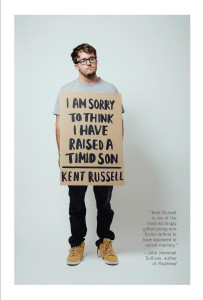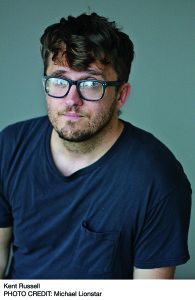An Interview with Kent Russell, Author of “I am Sorry to Think I Have Raised a Timid Son” Published by Alfred Knopf
“I am Sorry to Think I Have Raised a Timid Son,” Kent Russell’s irresistibly engaging debut collection of essays, intertwined with personal history, is easily one of the best books of the past year. In a uniquely homespun, yet masterfully polished voice (think Mark Twain meets Joan Didion) Russell has us from the book’s title, which is actually a quotation from Daniel Boone, whose presence and notions of masculinity set a template of sorts for the essays and reflections that follow. Mixing autobiography (in particular, the Turgenev-esque healing of wounds – or at least Mexican stand-off – between father and son) with such wide-ranging topics as a stay on a remote island with a present-day Robinson Crusoe and a visit with a former hockey enforcer looking back on his bruiser’s life, Russell merges erudite insight with highly-developed powers of observation.
Born and raised in Florida, Russell now lives in Prospect Lefferts Gardens. He’s become a confirmed Brooklynite.
On a frigid and overcast January afternoon, at lunch in Fort Greene’s Cafe Paulette, I begin our conversation by asking Russell how he came to live in Brooklyn.
KR: I moved to New York to go to NYU’s Graduate School of Journalism. My sisters Lauren and Karen [Note: Karen Russell is the wildly inventive and prodigiously gifted author of Swamplandia! and Vampires in the Lemon Grove] were living in Washington Heights. Because I got a job at Yeshiva University, I stayed in Washington Heights until I decided to focus on my writing and moved to Brooklyn.
Eagle: Are you part of the Brooklyn Literary Mafia: Amis, Auster, Egan, Lethem, et al.?
KR: Truthfully, no. I mean I’m certainly aware of them and I know they live in Brooklyn, but I tend to hang mostly with fellow ex-Floridians. It’s a very small diaspora. I teach a course at Columbia so, of course, I have colleagues and acquaintances on campus. And friends in Brooklyn. But my inner radar seems to always point me in the direction of folks from my home state.
Eagle: You write about, to put it mildly, some fairly eccentric people. It would have been so easy to have ridiculed them, to have hoisted them on their own petards. But you scrupously, and generously, avoid this. How did you resist the temptation?
KR: Actually, since I’m not someone who’s usually forthcoming, I feel a sense of responsibilty when writing about others. My starting point is always to ask questions. Whenever you report something — especially when it’s something about someone else’s life, about their more intimate stuff — you become like a simpering [talk show] host insofar as you want to make the subject feel as though you’re here for them only, you’re their closest confidante in the world and, oh yeah, don’t worry about the live studio audience all around us. It’s a lot like what Janet Malcolm elucidated in the first few pages of “The Journalist and the Murderer.” I don’t have a performative persona; I like to observe and just be open to the world. One of my literary heroes in that regard is Montaigne.
Eagle: Your use of metaphors (“feet slow as Christmas.” “like raised hands eager to ask a question”), adjectives (“gnatty drizzle,” “peep yellow”) and verbs (“ragdolling,” “Pollock’ed”) is truly astounding. How do you come up with these?
KR: My sister Karen and I joke about who can come up with the best adjectives. We usually run neck and neck. One source I’ve discovered for some of this stuff is a three volume dictionary of American slang. I’m always trying to top myself.

Eagle: You may have done it with “that sounds about as feasible as squeezing it off mid-pee.”
KR: (Laughing) I don’t know how I come up with some of this stuff. When you ask me me about these one-liners and bon-mots and crazy metaphors, I guess it makes me think of sword fighters. Like, I am obviously not a sword fighter, nor have I ever been one. But I imagine that the best, most fluid, most reactive and most dangerous sword fighter is the one who isn’t worried about getting hurt. You know? The one whose head is empty, who can just “flow.” That’s the state I aspire to when I’m writing.
Eagle: Growing up, were you an avid reader. And who, and what, did you read?
KR: Everyone in our family read voraciously – and eclectically. My mom would read self-help books, followed by deep, intellectual tomes, followed by pulp thrillers. Karen read so much that she would be like Mr. Magoo, walking into things with a book in her hand. She’d be reading the cereal box at breakfast. Also, every Friday our mom would take the three of us to the local Borders and tell us to pick out three books. It didn’t have to be the canon; it could be any book, by any author. Our tastes and interests were wide-ranging and I believe this enriched our writing – and our lives.
Eagle: Finally, the cover of your book is so droll and apropos. [Note: the book’s cover is a photo of Russell wearing a sandwich board with the title hand-lettered on a sandwich board.] Whose idea was it?
KR: The brains behind the cover was Peter Mendelsund. You should Google some of his other covers; you’ll see that the dude is a legit master. I was more than a little skeptical about his idea, but he seemed very sure of it, so I went with it. I knew well enough to give an artist his freedom, and to trust in his vision. Plus, he orchestrated my first (and most likely last) photo shoot!

